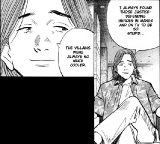|
>>
|
No. 4382
[Edit]
File
130815343656.png
- (196.72KB
, 587x529
, You know it's true.png
)

>>4381
>How can people dislike Accelerator?
He was depicted as a ruthless murderer in S1. I think people began to hate him then and even if the character itself changes most of the time audience tends to feel the same about him (well, that may be different if the character was initially good but even then they will try to justify his actions). Initial impression is important even in anime.
>quite disliked Near and Mello in Death Note
I think it would be easier and less time-consuming to count people who actually liked them.
>>4381
>I can remember feeling that way as far back as Power Rangers as a kid
Yep, same here. I always sympathized with the villains. Maybe I felt bad for them as they got their ass kicked all the time, maybe it was just a need to go against the popular opinion, maybe I was a misogynist from the day I was born. I don't know. But I always liked them.
I still hate traitors, though (no matter which side they betray).
>I wouldn't say that a lack of completely evil and unlikable villains is necessarily a bad thing though, one of the factors that drew me towards anime in the first place was all the grey shades of morals as opposed to the simple black and white of evil and good that's more common in western shows.
I'll have to disagree here. True, there are some shows where it's hard to decide who's the 'bad guy' but that's just because in pretty much all of those the roles are reversed and you end up with a villainous protagonist who's getting bonus sympathy points since the story is told from his POV and audience tends to associate with him. Of course this isn't exactly new and there are countless examples of shows like this even in western TV (Dexter and stuff like that - I'm afraid I wouldn't really know as I don't watch TV). I remember watching a series of documentaries on... Discovery (or not?) about how prisoners escaped jail. Since the story it told from their POV I was very disappointed when they were caught. So much time spent planning and preparing and when they finally managed to taste freedom they were caught again.
But most of those were murderers on the death row. They tried to escape because they had absolutely nothing to lose. It's ridiculous to feel any sort of sympathy towards scum like that, right? The documentary itself didn't really try to justify their actions and there were bits of interviews with prosecutors and such who kept repeating why they were terrified to find they escaped as they were dangerous etc. etc. But in the end I felt that they sounded like assholes and almost wanted to shout 'leave those poor prisoners alone!'. Even in the episode about the famous Texas Seven who killed a policeman after escaping prison (the scene itself was reconstructed in the documentary) it felt bad when they were caught.
What I'm trying to say is you don't have to change the characters, the story, the facts, even the smallest of details. Just retell the story from a different POV and you're done - now the villain be liked and the hero will be a self-righteous asshole. You can't expect people to be objective after all.
I still feel this thread has potential to be interesting.
|